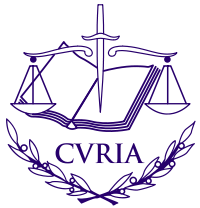- Court of Justice of the European Union
-
Not to be confused with the European Court of Human Rights, the supranational court based in Strasbourg.
Court of Justice
of the European Union
Established 1952 [1] Type EU institution Seat Luxembourg Website curia.europa.eu The Court of Justice of the European Union (CJEU) is the institution of the European Union (EU) which encompasses the whole judiciary. Seated in Luxembourg, it has three sub-courts; the European Court of Justice, the General Court and the Civil Service Tribunal.
The institution was originally established in 1952 as the Court of Justice of the European Coal and Steel Communities (as of 1958 the Court of Justice of the European Communities). With the entry into force of the Treaty of Lisbon in 2009, the court changed to its current name and comprises formally the Court of Justice alongside its two subordinate chambers: the General Court (formerly the Court of First Instance) and the Civil Service Tribunal.
Its mission is to ensure that "the law is observed" "in the interpretation and application" of the Treaties. The Court reviews the legality of the acts of the institutions of the European Union; ensures that the Member States comply with obligations under the Treaties; and interprets European Union law at the request of the national courts and tribunals.
The Court constitutes the judicial authority of the European Union and, in cooperation with the courts and tribunals of the Member States, it ensures the uniform application and interpretation of European Union law.
The Court of Justice of the European Union consists of three courts:
- The European Court of Justice (created in 1952; formally the Court of Justice)
- The General Court (created in 1988; formerly the Court of First Instance)
- The Civil Service Tribunal (created in 2004)
Since their establishment, approximately 15,000 judgements have been delivered by the three courts.
External links
References
- ^ "CURIA - General Presentation - Court of Justice of the European Union". CURIA. CURIA. http://curia.europa.eu/jcms/jcms/Jo2_6999/. Retrieved 14 October 2011.
Court of Justice of the European Union  European Court of Justice (members) · General Court · Civil Service Tribunal · Relationship with ECHR
European Court of Justice (members) · General Court · Civil Service Tribunal · Relationship with ECHRRulings and case law (preliminary ruling) Allonby v Accrington and Rossendale College · Apostolides v Orams · Bosman ruling · Cassis de Dijon · Chacon Navas v Eurest Colectividades SA · Chen case · Ciaran Tobin extradition case · Coleman v Attridge Law · Costa v ENEL · European Union Microsoft competition case · Factortame litigation · Francovich principle · Kamer van Koophandel en Fabrieken voor Amsterdam v Inspire Art Ltd · Kolpak ruling · Tanja Kreil · Marleasing SA v La Comercial Internacional de Alimentacion SA · Metock case · Nordsee case · Palacios de la Villa v Cortefiel Servicios SA · Peter Paul and Others v Bundesrepublik Deutschland · Procureur du Roi v Dassonville · Ralf Sieckmann v Deutsches Patent und Markenamt · Van Duyn v Home Office · Van Gend en Loos · Webster rulingEuropean Union Portal · Law Portal Categories:- European Union law
- Institutions of the European Union
- Organisations based in Luxembourg City
- 2009 establishments
- European law stubs
Wikimedia Foundation. 2010.
